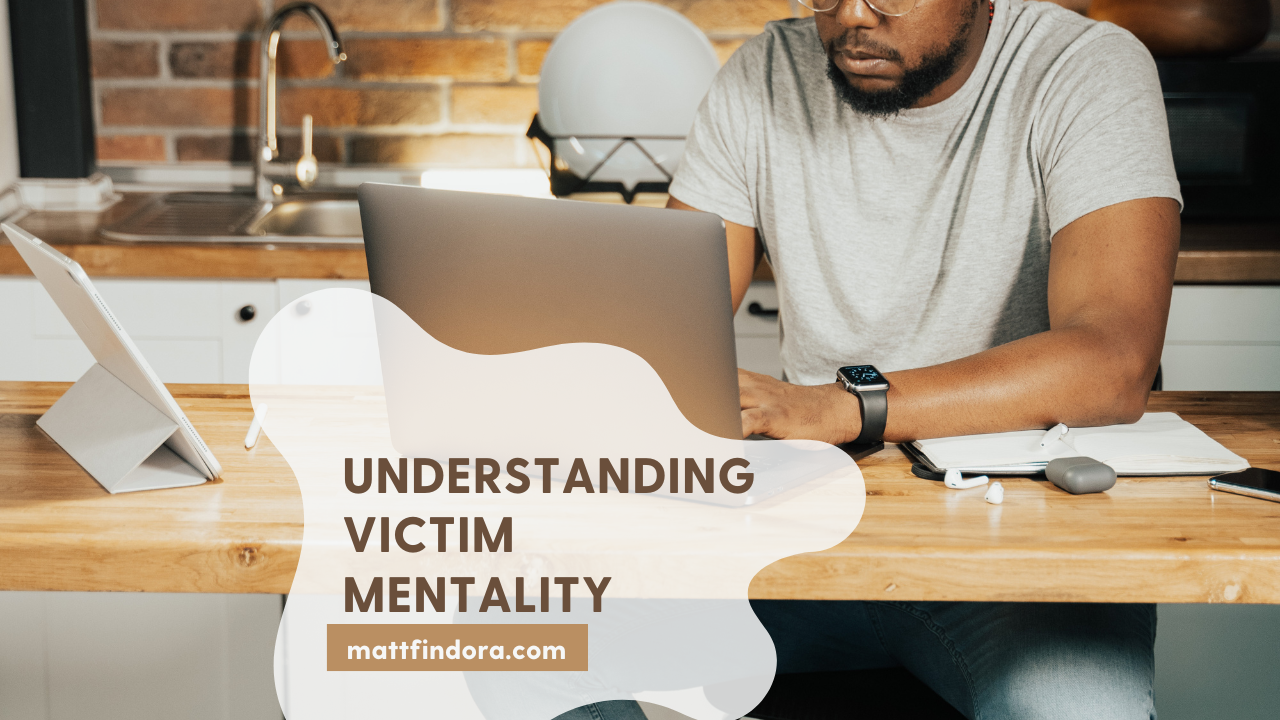Understanding Victim Mentality
Oct 04, 2022
What Is Victim Mentality?
Victim mentality is a learned behavior in which a person believes that no matter what they do, they cannot succeed because of what others do or what happens to them. Individuals with this mindset believe that they are stuck in their life, that bad things will always happen to them, it’s other people’s fault for their misfortunate and change will not make things better.
Oftentimes, this mindset stems from a traumatic experience or event that happened in someone’s life and they did not develop a healthy way to cope.
Symptoms of Victim Mentality
-Zero responsibility over their life
-Constantly seeking attention and sympathy from others
-Avoid vulnerability
-“Stuck” in life
-Feel attacked when given feedback
-Find difficulty in self-assessing
-Excessive self-deprecation
-Lack vision
-Jealousy
-Lack empathy
-Self-entitlement
-Provides examples on why things won’t work
-Quick to judge and categorize other people
-Self-sabotage
-Increasingly aware of negative things that could happen.
People who have a victim mentality may suffer from any of these above, but these are some of the most common symptoms. When someone suffers from this mentality, they do not take any responsibility of their life. They believe that everything that happens to them is negative and the result of someone else. The super from lack of self-esteem and self-confidence and end up sabotaging their own life.
These individuals believe in Murphy’s Law, where anything that’s bad could happen to them in each situation they are in. They also believe in “fairness” and justice.
Where Does It Come From?
Past trauma
Being a victim can be a way that someone copes with a traumatic experience or event. If someone has dealt with neglect or abuse, they may feel as though this is the best way to get the attention they desire.
Betrayal
At some point, someone in our life does not follow through with a commitment and that can lead someone down this road. They believe that everyone they meet will have let them down or that they cannot trust or rely on anyone, but themselves.
Codependency
A codependent person with this mindset usually gives up on their own hopes and dreams for someone else. That person can be a spouse, parent, child, etc.
According to Harley Therapy, one example is between an alcoholic and their significant other. The “caregiver” can play the victim by saying they put up with the alcoholic behavior, but also use guilt to attempt to control the alcoholic.
Manipulation
Some people try to get others to feel sorry for them and guilt them into sympathy. Oftentimes, this is a result of narcissistic behavioral disorder.
Consequences
-Difficulty in maintaining long-lasting personal relationships
-Consumed with guilt and shame
-Inability to enjoy personal successes
-Inability to feel pleasure or process positive feelings
-Hopelessness
-Attract like-minded individuals
When someone suffers from a victim mentality, they begin to lose their personal relationships. It’s difficult for them to create new relationships because they attract other victim mentality individuals. Everyone has had some small achievement in their life, whether that’s winning a medal, waking up on time or eating the right food. This mindset prevents people from seeing and accepting those successes. They look at the negative side of things instead, such as “that medal was in the past and I’m not that person anymore”, “Tomorrow, I won’t be able to wake up on time” and “healthy food just isn’t for me.”
How to Stop Being a Victim
-Take responsibility of your life
-Practice self-care
-Set boundaries
-Education
-Practice gratitude
-Find a therapist or coach
-Love yourself
Victim mentality is a learned behavior, which means you can learn something new to take its place. It all starts with learning to take control of your life. The road to happiness starts with 2 things: Purpose and Progress. You have to be very clear with what you want in your life and you have to set your vision on that purpose. Progress may feel slow, but progress is still progress. You can’t have progress without a purpose.
Don’t forget to practice self-care and love yourself. Self-care can be something as simple as getting a massage, taking a warm bath or going for a walk. People who suffer from this mentality often forget to love themselves. They look for external love instead of inner love.
Educate yourself on how you can continue your self-development. If you’re reading this, then you’re already on the correct path.
Practicing gratitude may be very difficult for some people who are constantly blaming others for their situation, but it’s important to find one thing each day to be grateful for. Even in the midst of chaos, we can find one silver lining.
If you need help, a therapist or a coach can help you. There are somethings that therapists are much more equipped to handle than a coach; however, both are viable options.
If you are ready to take back control of your life or you know someone who needs to do so, don’t be afraid to ask for help. Creating a strong support system and educating yourself is the best way to start releasing the victim mentality.
Thank you for reading. Don't forget to motivate yourself, elevate your mind and inspire others.
Stay connected with news and updates!
Join our mailing list to receive the latest news and updates from our team.
Don't worry, your information will not be shared.
We hate SPAM. We will never sell your information, for any reason.
